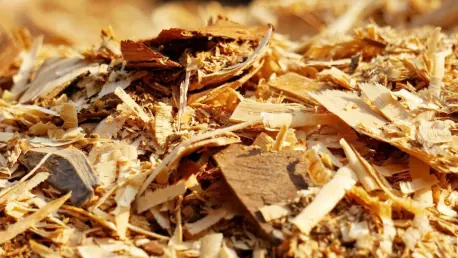An ambitious research initiative at the University of Tennessee has set its sights on redefining the use of wood waste by transforming it into a viable alternative to metal. Led by Art Ragauskas and backed by a $2 million contract from DARPA, this project, Waste Upcycling for Defense (WUD), is a collaborative effort involving the University of California, Riverside, and Georgia Tech. The project aims to create a cost-effective, environmentally friendly alternative to metals from wood waste, which is typically produced in various industries like home construction, furniture manufacturing, landscaping, and lumber milling.
Addressing Wood’s Natural Weaknesses
Despite wood’s potential, its natural lack of strength has historically limited its structural applications. This challenge lies in the presence of lignin, a binding component that must be removed to enhance wood’s strength. Studies indicate that by removing lignin and compressing the remaining cellulose, wood can achieve a strength comparable to steel. However, the densification process becomes increasingly complex when dealing with mixed wood waste materials such as sawdust, scrap wood, cardboard, and paper.
The research team is dedicated to overcoming these challenges by developing methods to transform mixed wood waste into high-strength densified boards. This innovative approach aims to reduce the energy consumption associated with metal processing and fabrication. If successful, these materials could revolutionize numerous industries by providing an eco-friendly alternative to metals used in automobiles, aircraft, and buildings. The emphasis on sustainability underscores the project’s significance in the broader context of material science advancements and environmental stewardship.
Historical Context and Modern Applications
Interestingly, the concept of densified wood for structural applications is not entirely novel. As early as the 1930s, densified wood was already being utilized in the construction of military aircraft in the United States and Germany. This historical context illuminates the material’s proven potential, while contemporary advancements aim to expand its applications even further. The current initiative not only proposes turning ‘trash to cash’ but also seeks to minimize landfill usage and reduce logistical complexities for building materials, particularly in remote areas.
The potential impact of this research is multifaceted, reflecting a trend towards sustainable material development. By converting waste wood into valuable resources, the initiative addresses pressing environmental issues while providing high-performance materials. As industries continue to seek cost-effective and eco-friendly alternatives to traditional materials, the implications of this research extend beyond immediate applications. It points towards a future where sustainability and efficiency go hand in hand, fostering innovation in material science.
Future Considerations and Impact
The ongoing research at the University of Tennessee and collaborating institutions represents a dynamic shift towards integrating sustainability into various sectors. By leveraging advanced material science and upcycling technologies, the project aims to create a paradigm shift in how wood waste is perceived and utilized. The potential benefits are vast, ranging from reduced landfill waste to significant energy savings in metal processing. With continuous advancements, the materials developed through this initiative could offer superior performance and durability for various applications, catalyzing a broader adoption of sustainable practices across industries.
The future of sustainable material development hinges on continued investment in research and innovation. The lessons learned from the WUD project could pave the way for new methodologies in upcycling and material processing, ultimately leading to the widespread adoption of eco-friendly alternatives. As the world grapples with the challenges of resource scarcity and environmental degradation, such initiatives offer a beacon of hope and a clear path forward. The success of this research could inspire similar projects globally, fostering a more sustainable and resilient approach to material usage and waste management.
Moving Towards Sustainable Solutions
An ambitious research initiative at the University of Tennessee aims to revolutionize the use of wood waste by converting it into a viable alternative to metal. The initiative, called Waste Upcycling for Defense (WUD), is led by Art Ragauskas and supported by a $2 million contract from the Defense Advanced Research Projects Agency (DARPA). This collaborative effort includes contributions from the University of California, Riverside, and Georgia Tech. The project’s goal is to develop an environmentally friendly, cost-effective alternative to metals made from wood waste, which is typically generated in industries such as home construction, furniture manufacturing, landscaping, and lumber milling. By doing so, the project hopes to not only find a practical use for wood waste but also reduce reliance on metals, which have a significant environmental impact. Transforming wood waste into a metal substitute could change various industries, providing sustainable materials while addressing the environmental challenges associated with metal production.









